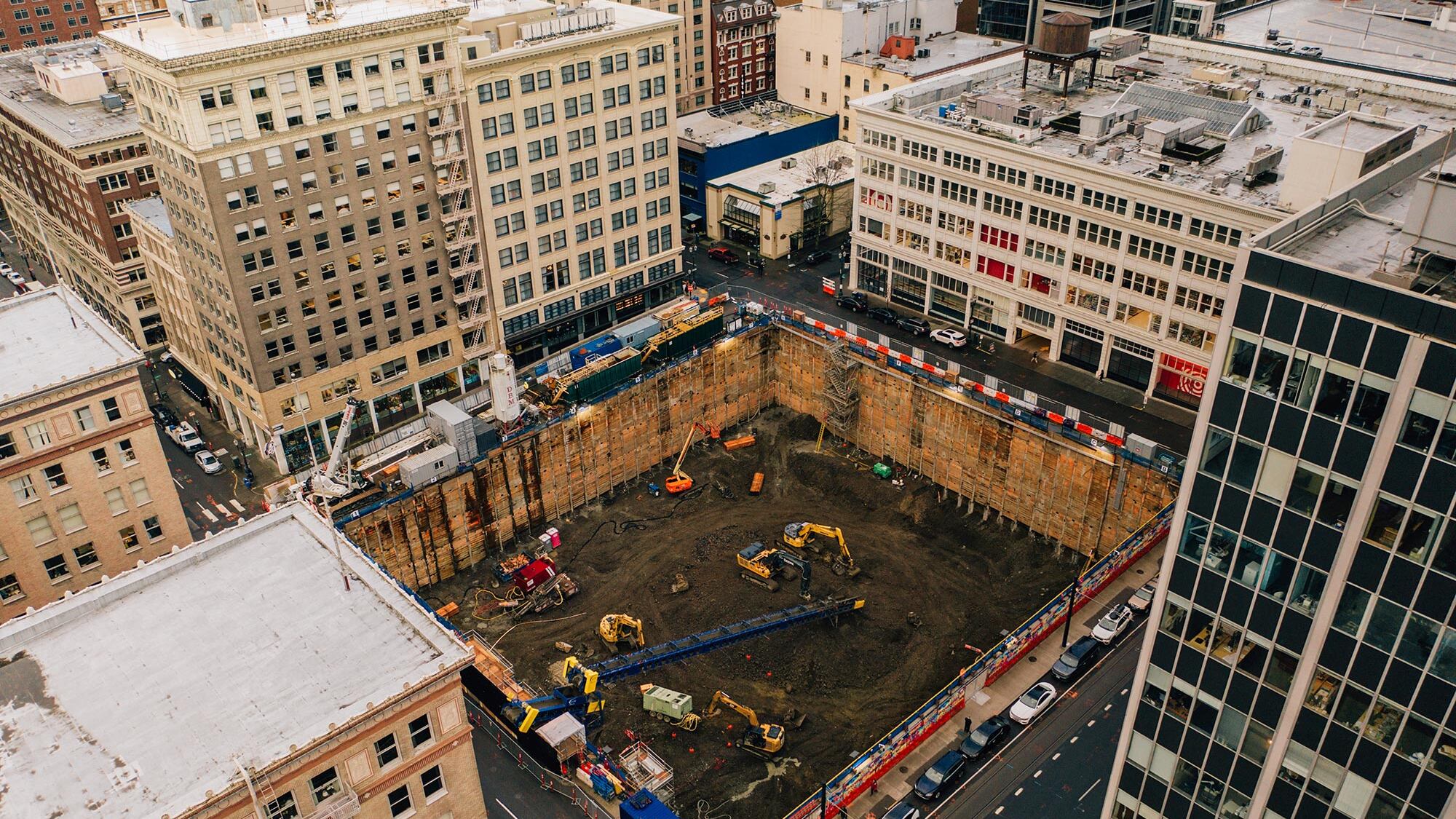On Southwest Washington Street between 9th and 10th Avenues, dirt and pumpkin-sized rocks slam into the bottoms of an endless stream of side-loading semitrailers and dump trucks.
Fifty feet below street level, excavation continues, with two brawny backhoes feeding a conveyor belt that fills a truck in three minutes. Another machine acts as a mobile pile driver, breaking up bedrock. The sensory experience for passersby is like being inside a galvanized trash can while somebody pours gravel over the lid and hits the can with a baseball bat.
When they are done, contractors at the site of the planned Ritz-Carlton hotel will have removed 2 million cubic yards of earth and rock—enough to fill 23 Olympic-sized swimming pools. And in the process, they've alarmed executives from the city's best-known hotel chain, which owns three properties near the excavation site.
Records obtained by WW show that for months, the clanging, roaring cacophony coming from what city officials call Block 216 (see map) has been a point of contention between Provenance Hotels, the Portland company founded by U.S. Ambassador to the European Union Gordon Sondland, and contractors for BPM Real Estate Group, developer of the Ritz-Carlton project.
Provenance owns three hotels—the Sentinel, the Woodlark and the Dossier—within two blocks of the project. At those hotels, Provenance says, the noise is so loud that concierge desks are handing out earplugs.

City rules allow construction on weekdays from 7 am to 6 pm, but records show BPM's contractor, Howard S. Wright Construction, asked the city's Noise Review Board last October for a variance from those rules. The company wanted to excavate all night.
An attorney representing Provenance pushed back hard at the board's October meeting, suggesting Provenance would appeal any noise variance to the Portland City Council and would seek compensation, including "paying for all the hotel rooms during the variance time."
In response, the board extended the hours of construction on the Ritz-Carlton, adding two hours between 5 and 7 am, but only for a two-week trial period.
BPM, a Portland company run by Walt Bowen, built the Pearl West and Broadway Tower buildings in recent years. BPM says it's doing all it can to mitigate the effects of the Ritz-Carlton project. (The Goodman family owns the land under the planned hotel, but isn't involved in the dispute and declined to comment.)
"Our team has worked closely with both the noise variance committee and adjacent property owners to minimize the impact as a result of the excavation," says Pat Walsh, a spokesman for the developer.
BPM altered the staging of its trucks, which now line up adjacent to the vacant O'Bryant Square; brought in a less noisy conveyor belt; and recently added acoustic screening where the trucks are loaded.

One subtext to the dispute: Portland's hotel market is getting crowded.
That's reflected in lower occupancy rates and stagnant room revenue. Data gathered by Travel Portland shows that from 2016 through 2019, the number of rooms in the central city (which includes the Lloyd District) jumped by 31 percent to 9,729. During the same period, occupancy rates slipped from 81.5 percent to 77.1 percent.
The Ritz-Carlton, which will have 251 guest rooms, is one of three new hotels coming to the neighborhood. (The 220-room Hyatt Centric at 11th and Alder and the 197-room Moxy at 10th and Alder will be finished much sooner.)
Provenance is a famously competitive company, which for years led opposition to the construction of a publicly subsidized hotel next to the Oregon Convention Center. (A new, 600-room Hyatt opened there earlier this month).
But Provenance's in-house lawyer, Karen Moyer, says competition with the future Ritz is not her company's concern. "We support what they are doing 100 percent," Moyer says. "We are friendly competitors, but it's not a hotel yet."
Instead, Moyer says, Provenance is simply looking out for its guests. "People come to our hotels to sleep," Moyer says. "One of the things we can offer is a good night's rest."
The noise flap comes after a tumultuous period for Provenance, which owns or manages 14 hotels, including five in Portland.
Although Sondland gave up all management responsibility at the company when he was confirmed as ambassador in June 2018, his role in the Trump administration's Ukraine intrigue led to a backlash last fall, highlighted by Oregon Congressman Earl Blumenauer's call for a boycott of Provenance properties.
Local public opinion on Sondland appeared to shift when he emerged in a Nov. 20 congressional impeachment hearing as perhaps the most damaging witness against the president. The goodwill faded, however, after Portland Monthly and ProPublica broke the story Nov. 27 that three women had accused Sondland of sexual harassment (he denied any wrongdoing).
Meanwhile, Provenance employees carefully monitored the impact of excavation noise on the three affected hotels.
Moyer says Provenance hotels have been disrupted by new construction before—but she's unaware of any project obtaining a variance to do night work as Wright did.
She and other managers have taken turns sleeping in the hotels to keep tabs on noise levels. "I have stayed in the hotels several times," Moyer says. "I care about our business. It's not a hardship to stay in our hotels—they are very nice."

Provenance has taken steps to minimize the impact on guests, giving them earplugs and choosing carefully where to book them in the affected hotels.
The current state of the variance is that Wright may begin work at 6 am—one hour early—until the end of February, by which time excavation for the five-floor underground parking structure should be complete. Moyer is looking forward to that.
"There's just a lot of noise down there early in the morning," she says. "That's the price of progress."

